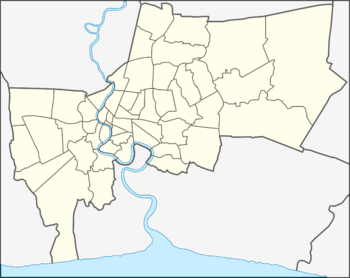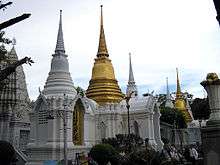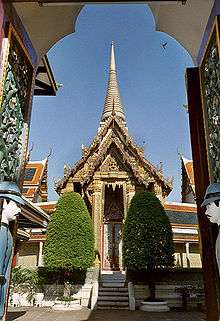Wat Ratchabophit
| Wat Ratchabophit | |
|---|---|
 View of Wat Ratchabophit Complex | |
 Location in Bangkok | |
| Basic information | |
| Geographic coordinates | 13°44′57″N 100°29′50″E / 13.74917°N 100.49722°ECoordinates: 13°44′57″N 100°29′50″E / 13.74917°N 100.49722°E |
| Affiliation | Theravada Buddhism |
| Country | Thailand |
| Architectural description | |
| Founder | King Chulalongkorn |
| Completed | 1869 A.D. |
Wat Ratchabophit or formally Wat Ratchabophit Sathit Maha Simaram Ratcha Wora Maha Wihan (Thai: วัดราชบพิธสถิตมหาสีมารามราชวรวิหาร), is a Buddhist temple on Atsadang Road, Bangkok, along Khlong Khu Mueang Doem, not far from Wat Pho and the Grand Palace. The temple was built during the reign of King Chulalongkorn (Rama V). The abbott of the termple is Somdet Phra Ariyavongsagatanana, the current Supreme Patriarch of Thailand.
Architecture
Inside the temple
The temple features a unique layout, with its wiharn and ubosot joined by a circular courtyard, at the center of which stands a gilded chedi. The golden chedi (43m high) is covered with orange-coloured tiles and on top of the chedi, there is a golden ball. There is a relic of Buddha inside and the chedi was built in Sri Lankan style.[1] The ordination hall has 10 door panels and 28 window panels each decorated with gilded black lacquer on the inside.[2]
The interior of the temple or bod, is inspired by gilded Italian architecture that Rama V saw on a visit to Europe. The entrance doors are 3m high and are decorated with inlaid mother-of-pearl, which represents various medals and decorations.[2] The drum tower is a two-storeyed one with hectogonal spires decorated with Benjarong ceramic nagas and Erawan heads.[1]
Royal Cemetery
On the west end of the temple grounds is the Royal Cemetery, with numerous monuments to major and minor members of the Thai Royal Family, most notably those in the immediate family of King Chulalongkorn. One of the memorials, the Rangsi Vadhana Memorial, contains the ashes of Mahidol Adulyadej, Srinagarindra and Galyani Vadhana.[1] A Christian church is on the grounds, as are many chedis and Khamer-face towers.[1]
Gallery
 Inside the shrine |
 Mausoleum of Savang Vadhana |
 View from outside |
 The front entrance with an image of watchman |
 door image |
 Outside view |
Notes
References
- Liedtke, Marcel (2011), Thailand- The East (English Edition), Norderstedt: Books on Demand GmbH, ISBN 978-3-8423-7029-6
- Spooner, Andrew; Hana Borrowman; William Baldwin (2011), Footprint Thailand, UK: www.footprintbooks.com, ISBN 978-1-904777-94-6
External links
| Wikimedia Commons has media related to Wat Ratchabopit. |